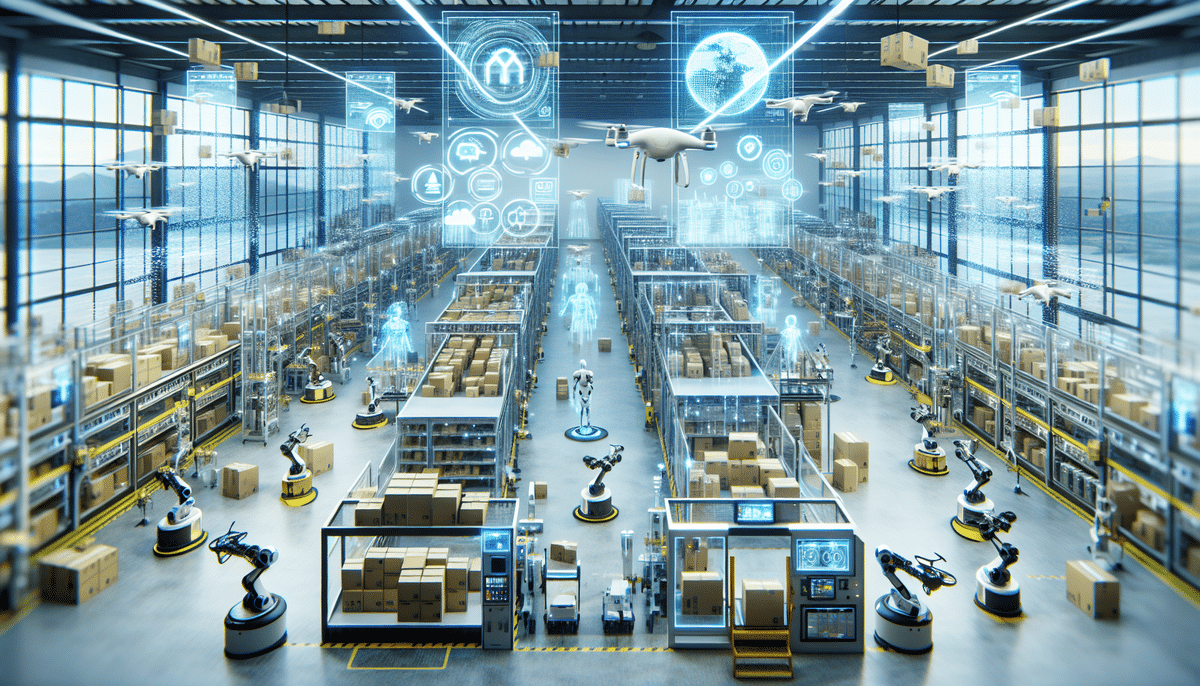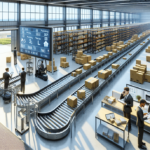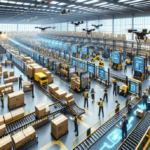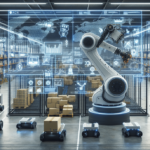Leveraging Artificial Intelligence in E-Commerce Logistics
In today's highly competitive e-commerce landscape, businesses strive to enhance operations, optimize costs, improve delivery speeds, and provide superior customer experiences. One of the most transformative technologies driving these advancements is Artificial Intelligence (AI). AI is revolutionizing the e-commerce logistics sector by redefining how goods are managed and delivered. This article delves into the benefits of using AI in e-commerce logistics and explores how it streamlines the entire process, from order fulfillment to last-mile delivery.
Key Benefits of AI in E-Commerce Logistics
Operational Efficiency
AI enhances operational efficiency by automating repetitive tasks such as order processing, inventory management, and shipment tracking. Automation reduces the risk of human error, accelerates processes, and allows employees to focus on more strategic activities. For instance, AI-driven systems can manage inventory in real-time, ensuring optimal stock levels and reducing the likelihood of stockouts or overstocking.
Cost Reduction
Implementing AI in logistics can lead to significant cost savings. According to a McKinsey study, companies can reduce operational expenses by up to 15% through AI-driven optimizations. AI enables efficient resource allocation, minimizes waste, and streamlines supply chain processes, contributing to lower overall costs.
Enhanced Customer Experience
AI-powered solutions, such as chatbots and personalized recommendation engines, significantly improve the customer experience. AI-powered chatbots provide instant support and assistance, resolving customer queries promptly and efficiently. Additionally, machine learning algorithms analyze customer data to offer personalized product recommendations, fostering loyalty and increasing conversion rates.
Improved Delivery Speeds and Accuracy
AI technologies like predictive analytics and route optimization algorithms enhance delivery speeds and accuracy. By analyzing factors such as traffic patterns, weather conditions, and delivery locations, AI can determine the most efficient delivery routes. This not only accelerates delivery times but also reduces transportation costs and minimizes the environmental impact.
AI Technologies Transforming E-Commerce Logistics
Machine Learning and Predictive Analytics
Machine Learning (ML), a subset of AI, enables systems to learn from data and improve over time without explicit programming. In e-commerce logistics, ML algorithms analyze historical data to forecast demand, optimize inventory levels, and anticipate potential disruptions. Predictive analytics helps businesses make informed decisions, ensuring timely product availability and efficient supply chain management.
AI-Powered Route Optimization
AI-driven route optimization tools analyze real-time data to determine the most efficient delivery routes. By considering variables such as traffic, weather, and road conditions, these algorithms can dynamically adjust routes to minimize delays and reduce fuel consumption. According to a study published in the Journal of Intelligent Transportation Systems, route optimization can lead to a 20% improvement in delivery efficiency.
Intelligent Warehouse Management
AI enhances warehouse management through automated picking and packing systems. Robotics integrated with AI algorithms can handle inventory with precision, increasing speed and accuracy while reducing labor costs. Additionally, AI-powered systems can optimize warehouse layouts, streamline inventory storage, and improve overall productivity.
Implementing AI in E-Commerce Logistics
Identifying Operational Pain Points
The first step in implementing AI is identifying the specific challenges within your logistics operations. Whether it's inefficient inventory management, delayed deliveries, or high operational costs, pinpointing the areas that can benefit from AI intervention is crucial for targeted and effective implementation.
Selecting the Right Technology Partner
Choosing a reputable technology partner is essential for successful AI integration. Look for vendors with a proven track record in AI solutions for logistics, robust support systems, and scalable technologies that can grow with your business. It's important to evaluate potential partners based on their expertise, compatibility with existing systems, and the quality of their AI offerings.
Integration and Scalability
Seamless integration of AI systems with existing logistics infrastructure is vital for maximizing benefits. Ensure that the chosen AI solutions are compatible with your current software and hardware. Additionally, scalability is important to accommodate future growth and evolving business needs, allowing your AI systems to expand alongside your e-commerce operations.
Training and Continuous Optimization
Successful AI implementation requires ongoing optimization and employee training. Continuously monitor AI performance, gather feedback, and make necessary adjustments to improve efficiency. Training staff to effectively use and manage AI tools ensures that the technology is leveraged to its full potential, driving sustained operational improvements.
Overcoming Challenges with AI in E-Commerce Logistics
Data Management and Security
Effective data management is crucial for AI success. Businesses must ensure that data collected from various sources is accurate, secure, and compliant with regulations. Implementing robust cybersecurity measures protects sensitive information and maintains customer trust.
Balancing Automation with Human Expertise
While AI can automate many logistical tasks, human oversight remains important. Striking a balance between automation and human intervention ensures that complex decision-making processes incorporate both technological efficiency and intuitive understanding. This synergy enhances overall logistics performance.
Adapting to Technological Changes
The rapid evolution of AI technologies requires businesses to stay adaptable and continuously update their systems. Investing in ongoing training, staying informed about industry advancements, and being open to adopting new AI solutions can help businesses remain competitive and fully utilize AI's capabilities.
Future Trends of AI in E-Commerce Logistics
Advanced Predictive Capabilities
Future advancements in AI will enhance predictive capabilities, enabling even more accurate demand forecasting and supply chain optimization. This will lead to better resource allocation, reduced waste, and improved overall efficiency.
Increased Automation and Robotics
The integration of AI with robotics will continue to advance, leading to fully automated warehouses and distribution centers. Enhanced robotics will further reduce labor costs, increase handling speed, and improve accuracy in order fulfillment processes.
Sustainable Logistics Solutions
AI will play a pivotal role in developing sustainable logistics solutions. By optimizing delivery routes and reducing fuel consumption, AI contributes to lowering the carbon footprint of e-commerce operations. Additionally, AI can aid in implementing circular economy practices by improving waste management and recycling processes.
Enhanced Data Security Measures
As AI systems handle more sensitive data, advanced data security measures will become increasingly important. Future AI technologies will incorporate more sophisticated encryption and threat detection mechanisms to safeguard data integrity and privacy.
Conclusion
Artificial Intelligence is a groundbreaking technology reshaping the e-commerce logistics industry. By enhancing operational efficiency, reducing costs, minimizing errors, and elevating customer experiences, AI offers numerous advantages to businesses. While implementing AI poses certain challenges, such as the need for skilled personnel and selecting the right technology partners, the long-term benefits significantly outweigh these obstacles. As e-commerce continues to expand, companies that integrate AI into their logistics operations will gain a competitive edge, ensuring sustained growth and success in the market.








